Archive for the ‘Ridley Scott’ Category
The Madness and Tyranny
Gladiator II
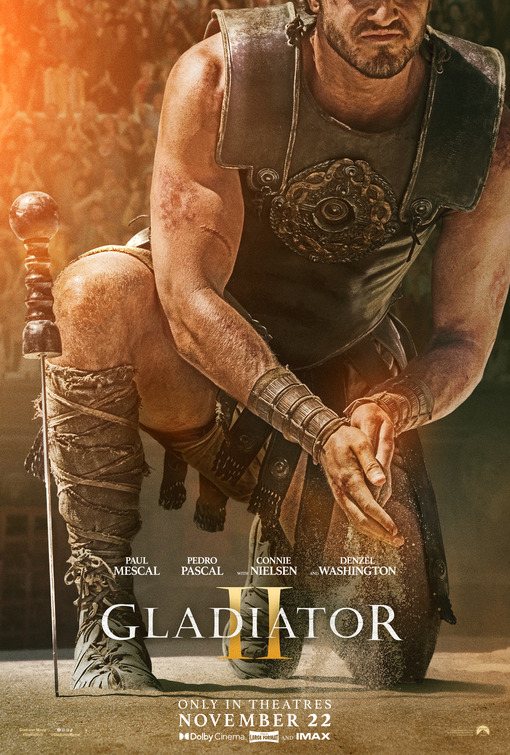
Director: Ridley Scott
Cast: Paul Mescal, Denzel Washington, Pedro Pascal, Connie Nielsen, Joseph Quinn, Derek Jacobi, Fred Hechinger, Rory McCann, Matt Lucas, Tim McInnerny
Running Time: 2 hours and 28 minutes
Film Rating: 8.5 out of 10
PLEASE NOTE THIS FILM IS EXTREMELY VIOLENT AND NOT SUITABLE FOR SENSITIVE VIEWERS
Sir Ridley Scott excels himself in the much anticipated sequel to the 2000 hit film Gladiator, Gladiator II assembling an international cast with Danish actress Connie Nielsen reprising her role as Lucilla and newcomer Oscar nominee Paul Mescal (Aftersun) taking on the role of Lucius, the forgotten son of Lucilla who is captured in Africa in 200 AD and returned to Rome. Pedro Pascal (The Great Wall, The Unbearable Weight of Massive Talent) plays the Roman army general Marcus Acacius, tough and strategic but unwillingly to continue serving at the whim of tyrant twin emperors.
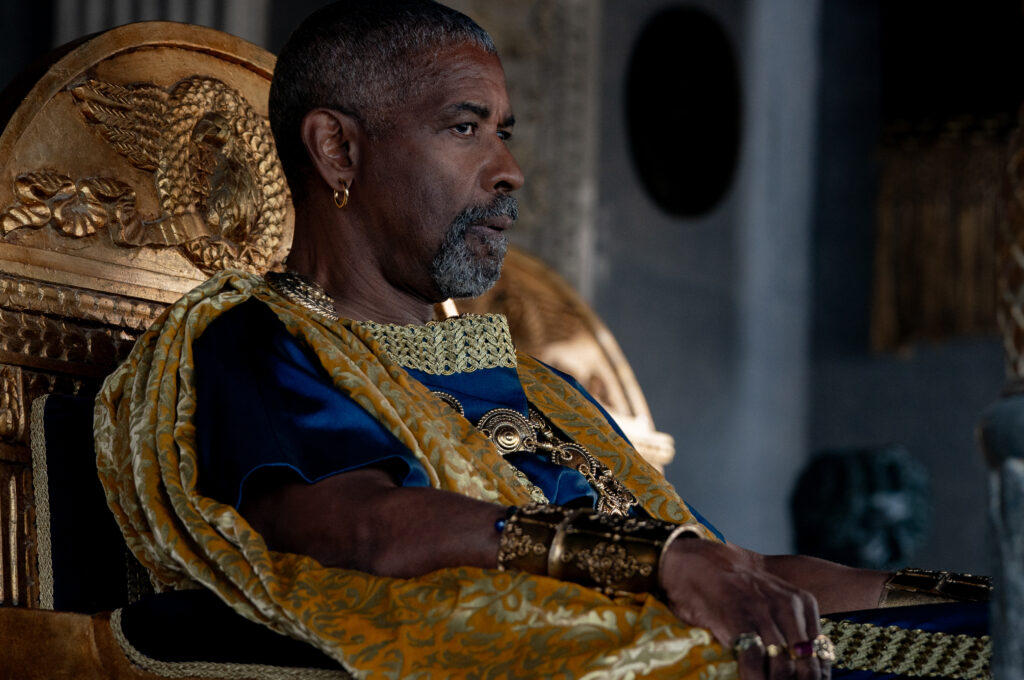
Lucius soon becomes the property of the wily and politically astute gladiator trader and confidant to the twin emperors Macrinus superbly played with wit and brutality by double Oscar winner Denzel Washington (Training Day, Glory). Denzel Washington is superb in this role and deserves a 3rd Oscar presenting his character to Lucius as a friend who needs to use Lucius as his blunt instrument as he secretly devises a coup to get rid of the crazy twin emperors and make a power grab.
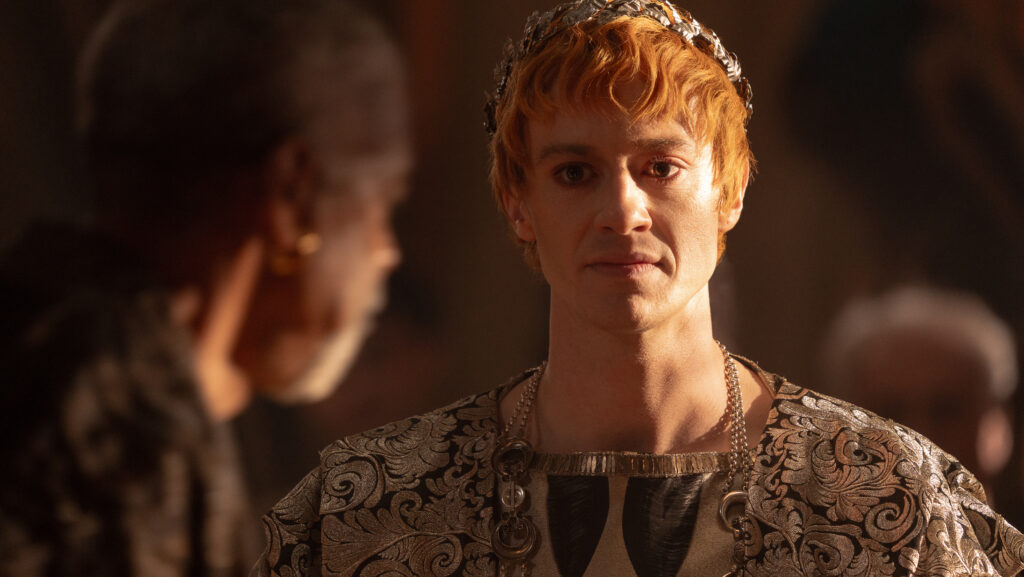
Rome in 200 AD is a heady, extravagant and brutal city, ruled by twin brothers Emperor Geta played by Joseph Quinn (A Quiet Place Day One) and Emperor Caracalla played by Fred Hechinger. Young men, covered with makeup, mischief and a malevolence as they lust for watching gladiators being viciously executed in the Coliseum, Rome’s temple to the blood lust. The Emperors are unhinged in a seriously bad way and the Romans are beginning to realize that the twins supposedly raised by wolves are not the most ideal political leaders. Macrinus is aware of their shortcomings.
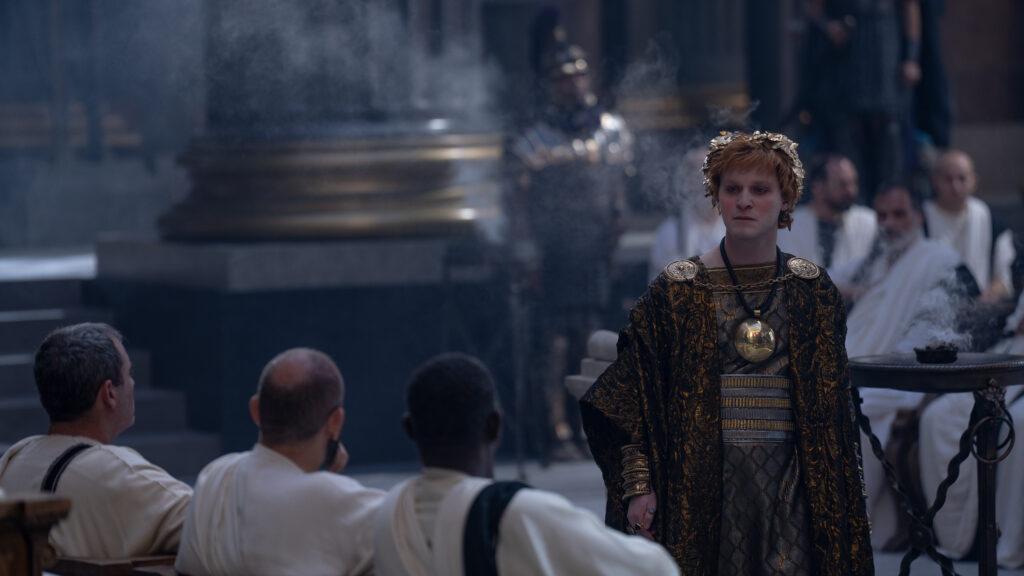
Gladiator II is a vast and ambitious film, expertly directed by Ridley Scott who fantastically captures the grandeur of the Roman capital, the lavishness of the city and the brutality of the population increasingly hungry for more tyranny and madness. The Gladiators have to fight Rhinos and in a particularly bizarre scene have to re-enact a naval battle scene between the Praetorian Guard and surly Gladiators amidst a coliseum flooded with shark infested waters.
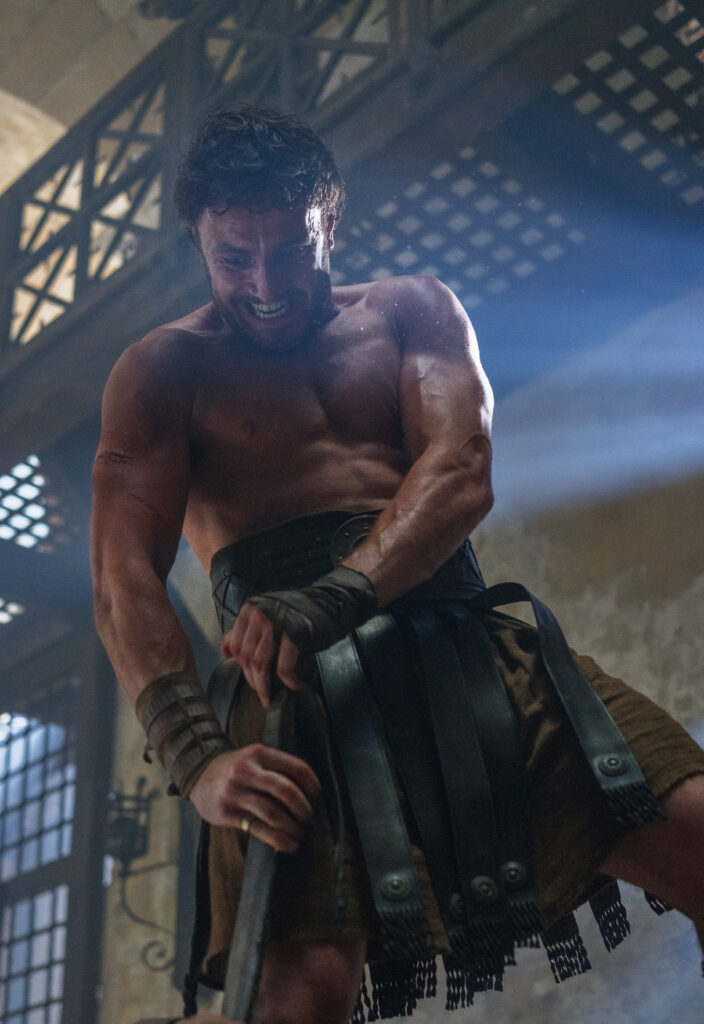
With electrifying screen presence, Paul Mescal whose international stardom will be cemented in Gladiator II is the central muscular hero of a film, whose brilliant elocution of lines and classical good looks with Mescal’s icy blue eyes portraying a vulnerability suppressed by his brute strength and desire for violence and vengeance.
Mescal’s Lucius is a complex man, torn by a classical past but thrust into a decadent world filled with revenge and hatred. Lucius demands a just and unified Rome as dreamt up by his grandfather Emperor Marcus Aurelius.
With a beautiful score by Harry Gregson-Williams and a surprising script by David Scarpa, whose labyrinthine tale will deliver enough shocks and twists, ensuring that Gladiator II is a fascinating and brittle tale of how vanity and power corrupts a once noble empire. In this Roman epic, one man’s destiny can only be salvaged at the expense of another man’s demise.
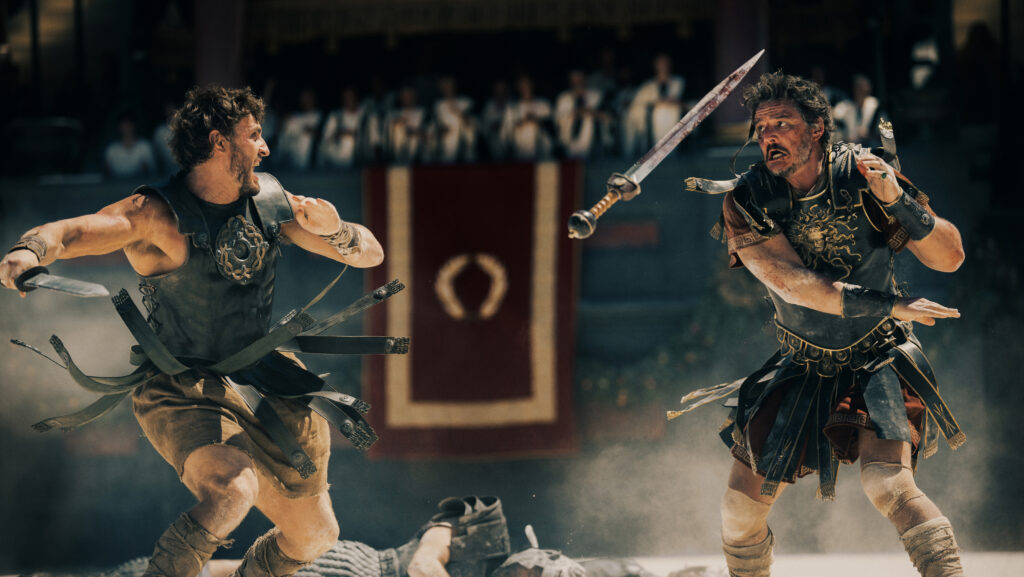
There are lots of plot twists in Gladiator II but overall the film is superb, an epic Roman tale about greed, power and the collapse of tyranny.
Ridley Scott outdoes himself and Gladiator II should be recognized at the 2025 Oscars for Best Picture, Best Original Score, Best Production Design, Best Costume Design and of course Best Actor for Paul Mescal and Supporting Actor for Denzel Washington. Both Paul Mescal and Denzel Washington are brilliant in this lavish epic. Be dazzled and see it in cinemas on the biggest screen possible.
Gladiator II gets a film rating of 8.5 out of 10, stunning, sumptuous and filled with shocking scenes that will both repel and fascinate the viewer held together by two excellent performances. It’s a bloody entertaining epic and recommended viewing especially for history buffs.
That Corsican Ruffian
Napoleon

Director: Ridley Scott
Cast: Joaquin Phoenix, Vanessa Kirby, Rupert Everett, Julian Rhind-Tutt, Tahar Rahim, Sinead Cusack, Ben Miles, Paul Rhys, Ludivine Sagnier, Jannis Niewohner, Julian Wadham, Miles Jupp, Edouard Philipponat
Running Time: 2 hours and 38 minutes
Film Review: 9 out of 10
Oscar nominated veteran director Ridley Scott (Thelma and Louise, Gladiator, Black Hawk Down) helms this meaty historical drama Napoleon, which is magnificent held together by two multifaceted performances by Oscar winner Joaquin Phoenix (Joker) as Napoleon and Oscar nominee Vanessa Kirby (Pieces of a Woman) as his wife, lover and soul mate Josephine.
Napoleon is a monumental film starting off with the bloody execution of the last Queen of France Marie Antoinette in 1793 and ending with the completely mind-blowingly epic Battle of Waterloo in 1815. Amidst this vast historical backdrop of war and political intrigue is the scandalous romance of the 19th century the gorgeous and tragic love story of Napoleon and Josephine.
Napoleon a tough, charismatic military general from Corsica in post-revolutionary France proves his military ingenuity and his strategic thinking in securing France’s position in an unstable Europe post the shocking and bloody French Revolution. That Corsican ruffian who skilfully eyed an historic opportunity to seize power in the confusion of the last days of the Reign of Tower by Robespierre, swiftly and efficiently rises to power to crown himself Emperor of France. With ruthless decisiveness, Napoleon seizes power through a military coup, compensating for his abandonment of the Egyptian campaign running from 1798 to 1801, in which France tried to conquer Egypt and Syria against the Ottomans to secure trade interests.

There is a macabre scene in Napoleon when he confronts a mummy in Egypt, with the pyramids shimmering in the Mediterranean heat, whereby he takes off the shroud and reveals the skull sitting defiant staring at the Tyrant symbolically revealing to the French Emperor how much death he will eventually cause.
Amidst massive battles at Austerlitz, Waterloo and the failed attack against the wily and clever Russian Tsar Alexander I wonderfully played by French-Finnish actor Edouard Philipponat, Napoleon’s tumultuous relationship with Josephine is intricately explored through his frustration at not being able to father a child with her.

From Josephine’s viewpoint she has chosen a ruffian, a stubborn brutish man who has changed her destiny and made her an Empress who she simultaneously adores and despises. Kirby and Phoenix are a perfect onscreen couple, their prickly energy is sexually attractive and equally complicated. Like Elizabeth Taylor and Richard Burton in Cleopatra, Joaquin Phoenix and Vanessa Kirby portray a complicated and powerful onscreen couple, allowing audiences to watch their fascinating love affair unravel in spectacular fashion playing out on a world stage in which even 19th century gossip columnists could not get enough of Napoleon and Josephine’s salacious love life, complicated by infidelity and infertility, neglect and sexual desire, divorce and estrangement.
Besides the talents of Phoenix and Kirby the rest of the cast is superbly chosen from British actress Sinead Cusack playing Napoleon’s mother Letizia Bonaparte (because let’s face it even tyrants have mothers) to Julian Rhind-Tutt (Blithe Spirit, Rush) as Sieyes and Ben Miles (Woman in Gold, Red Joan) as French politician Caulaincourt.
Others in the cast include Tahar Rahim (The Mauritanian) as Paul Barras to the talented Rupert Everett (The Comfort of Strangers, A Royal Night Out, The Madness of King George) perfectly cast as the pompous but clever Duke of Wellington, the one adversary who Napoleon cannot defeat despite his best military efforts at the crucial battle of Waterloo in 1815.
As a cinematic epic, Napoleon is elevated by a tonally balanced screenplay by David Scarpa who captures the bizarre and brutal zeitgeist of the first heady years of the Napoleonic wars from 1800-18h15. Scarpa deserves an Oscar nomination for best original screenplay.

Napoleon is gorgeously shot with expert cinematography by Oscar nominated Polish cinematography Dariusz Wolski (News of the World) and superbly directed by Ridley Scott who captures the chaos of war, the brutality of one man’s ego and the glamour of ambition combined with the lust to control everything. Napoleon ends off with the battle of Waterloo and a brilliant scene between Joaquin Phoenix and Rupert Everett discussing Napoleon’s untimely exile to St Helena in the South Atlantic.
On every level, Napoleon is a charismatic historical film, a multifaceted and brutal epic, a diatribe on man’s bloodthirsty ambition to create empires and his lust for celebrity status on a world stage.
Napoleon is a historical epic made with a European flair and in the hands of a veteran director like Ridley Scott this film is superb and robust, held together by two extremely powerful performances by a charismatic Joaquin Phoenix and the beautiful Vanessa Kirby as the dynamic and ruthless power couple who elegantly presided over one of the bloodiest periods of European history at the start of the 19th century.
Visually impressive and beautifully acted, Napoleon deserves recognition at the 2024 Oscars and gets a film rating of 9 out of 10. Utterly astounding and highly recommended viewing but only for those that enjoy grand cinema in the tradition of such Oscar winning films as A Passage to India, The Last Emperor and Amadeus.
The Vatican of Fashion
House of Gucci
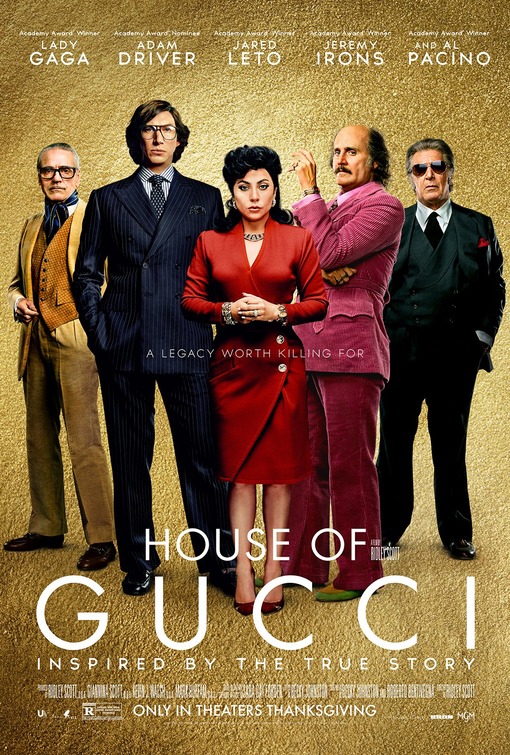
Director: Ridley Scott
Cast: Lady Gaga, Adam Driver, Jeremy Irons, Al Pacino, Jared Leto, Jack Huston, Salma Hayek, Camille Cottin, Reeve Carney
Film Rating: 7.5 out of 10
Running time: 2 hours and 38 minutes
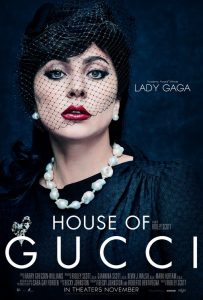
Oscar winner Lady Gaga (A Star is Born) takes on the role of Patrizia Raggiani, an ambitious young woman who catches and marries the heir to the Gucci Fashion empire Maurizio Gucci expertly played with a suitable amount of noble panache by Oscar nominee Adam Driver (Marriage Story, BlackKKlansman) in the unashamedly decadent new film by director Ridley Scott (Gladiator, American Gangster, Blade Runner, Thelma and Louise) simply called House of Gucci.
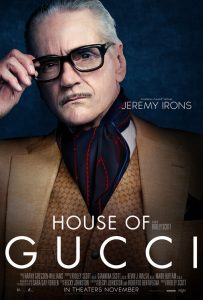
Despite the length of this film, it’s the brilliant casting of fellow Oscar winners Jeremy Irons (Reversal of Fortune) as Maurizio’s aging but elegant Tuscan father Roldolfo Gucci, Al Pacino (Scent of a Woman) as Maurizio’s flamboyant uncle Aldo and Jared Leto (Dallas Buyers Club) as the crazy cousin Paolo Gucci that makes House of Gucci so utterly enthralling and entertaining.
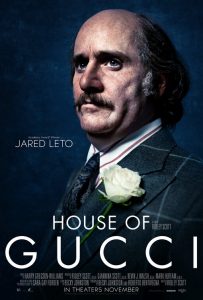
A wonderful tale of a family dynasty that crumbles from the inside out, of a fashion empire, once sacred that gets corrupted by greed, deceit and commercialization that to such a point, the once heralded name of Gucci turns to the young and emerging Texan fashion designer Tom Ford to revolutionize their look for the late 1990’s.

At the heart of all the backstabbing, the pure malevolence and the unadulterated affluence, is two brilliant performances by Lady Gaga and Adam Driver that hold this crazy family tale together. These two actors are the emotional core of a film which at times comes across as a soap opera, quite literally and at other times like the collapse of a deliciously evil empire that let in a scheming intruder.
Audiences should look out for some excellent supporting performances by Anjelica Huston’s nephew Jack Huston as the hard-nosed business advisor to the Gucci family Domenico de Sole and Oscar nominee Salma Hayek (Frida) as the outrageous fortune teller and clairvoyant Pina Aurienna, who influences Patrizia to go to extreme lengths to take revenge on her wayward husband Maurizio.

Similar in vein to Ridley Scott’s other film about an outrageously wealthy family the Getty’s in the Oscar nominated All The Money in the World, House of Gucci is bizarre, flamboyant and entertaining as this Italian family drama of deception, betrayal and legacy extends from Milan to Switzerland to the fashionable sidewalks of New York’s Fifth Avenue.
There are some tremendously funny lines in this film and Lady Gaga and Adam Driver deserve Oscar nominations for their roles as the infamous couple Patrizia Raggiani and Maurizio Gucci, whose fame is cemented in the fashion history books, drenched in recriminations and blood.
House of Gucci is a fascinating portrait of a family collapsing from the inside, of a notorious couple whose love sours into revenge and of a distinguished fashion house which had to evolve from an Italian family business into a multinational corporation as it reached the 21st century in order to remain appealing to the immensely wealthy American and Japanese markets.
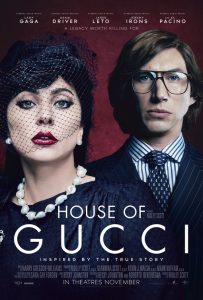
For its flaws and crazy foibles, House of Gucci gets a film rating of 7.5 out of 10 but audiences should see it for the electrifying performances of Lady Gaga and Adam Driver.
The duo are both Gucci guilty and gorgeous.
Hostages of Fortune
All the Money in the World
Director: Ridley Scott
Cast: Michelle Williams, Mark Wahlberg, Christopher Plummer, Timothy Hutton, Charlie Plummer, Romain Duris, Andrew Buchan
Gladiator and Blade Runner director Ridley Scott returns to the big screen with a true life Italian kidnap drama All the Money in the World starring Oscar winner Christopher Plummer (Beginners) as oil billionaire J. Paul Getty whose 16 year old grandson J. Paul Getty III expertly played with a nuanced vulnerability by Charlie Plummer, is kidnapped in Rome in the summer of 1973, based on actual events.
Paul Getty III known as Paul whose mother Gail Getty superbly played by Oscar nominee Michelle Williams (Manchester by the Sea, My Week with Marilyn) who should have received another Oscar nomination for her role in this film, is caught in a precarious situation when she cannot physically pay the $17 million ransom demanded by the thuggish kidnappers.
Gail Getty desperately pleads with her immensely wealthy father-in-law who categorically refuses to pay the ransom for the reasons that if he had to pay $17 million for every grandchild of his that got kidnapped, it would dent his already vast fortune. Ruthless, selfish and thoroughly frugal, J. Paul Getty made his vast fortune through drilling for oil in Saudi Arabia in the late 1940’s.
Similar to his Oscar nominated performance as Tolstoy in The Last Station, Christopher Plummer adds gravitas and respectability to the role of Oil Tycoon J. Paul Getty who surrounded himself with priceless antiquities and an expensive art collection worth millions on his massive Getty’s estate in England, but did not have the compassion to pay for his grandson’s release which would have secured his safe return from a truly nefarious mafia style gang of kidnappers in Calabria, in Southern Italy.
Gail Getty enlists the help of security broker Fletcher Chace played by Oscar nominee Mark Wahlberg (The Departed) as they both along with the Italian police try to expedite the safe return of Paul Getty. What follows is a tense kidnap drama in the style of Daniel Alfredson’s Kidnapping Mr Heinken.
With cinematic panache, director Ridley Scott makes full use of his Italian locations with extensive shots of Rome and its ancient Ruins along with the frenetic buzz of the Italian capital augmented by the ever present paparazzi as they hound the Getty family in what was to become one of the most sensational kidnap dramas of the 1970’s.
Gail Getty’s ex-husband, J. Paul Getty II played by Andrew Buchan, goes from heading up his father’s European oil empire to becoming a heroin addict in Morocco and is virtually out of the entire negotiation. The negotiation is a fiercely contested battle of the wills between Gail Getty and her ruthless father-in-law. She is desperate to get her beloved son Paul back in one piece.
Supporting actors include French actor Romain Duris as a sympathetic kidnapper Cinquanta as well as Oscar winner Timothy Hutton (Ordinary People) as the Getty’s financier Oswald Hinge.
Christopher Plummer and Charlie Plummer (no relation) are both brilliant as grandfather and grandson. Michelle Williams is fantastic as a desperate mother caught in this prolific dynasty but who conveys increasing helplessness in not being able to rescue her resourceful teenage son.
All the Money in the World is a captivating, stylish and gritty kidnap drama expertly directed by Ridley Scott and receives a film rating of 8 out of 10.
Man from Mars
The Martian
Director: Ridley Scott
Cast: Matt Damon, Jessica Chastain, Kate Mara, Sebastian Stan, Chiwetel Ejiofor, Jeff Daniels, Sean Bean, Kristen Wiig, Michael Pena, Donald Glover
Oscar winner Matt Damon (Good Will Hunting) takes the lead role in director Ridley Scott’s visually stunning adaptation of the Andy Weir novel, The Martian as he stars as Mark Watney, an astronaut who after a sandstorm on Mars gets stranded on the red planet by his fellow crew members who abandon him unknowingly to head back to earth.
The crew members include Captain Melissa Lewis played by Oscar nominee Jessica Chastain (Zero Dark Thirty), Beth Johanssen played by Kate Mara, Chris Beck played by Sebastian Stan (Captain America: The Winter Soldier), Rick Martinez played by Michael Pena (Antman, American Hustle) and Norwegian actor Aksel Hennie (Hercules) as Alex Vogel.
Meanwhile back at the Johnson Space Centre in Houston, Texas, NASA headquarters, Director Teddy Sanders played by Jeff Daniels channeling his role in Aaron Sorkin’s TV Series, The Newsroom, announces that Watney is dead. Back on Mars, Watney is alive and has to figure out a way to survive on a planet with minimal oxygen and no sustainable ecosystem to grow his own food supply, an obvious metaphor for the dwindling food supply on planet Earth. Watch out for a superb supporting role by Oscar nominee Chiwetel Ejiofor (12 Years a Slave) as Vincent Kapoor who firmly believes in finding Watney and bring him back to Earth.
Luckily Watkins is a trained botanist so with ingenuity and a lot of dry humour, he manages to harvest a small crop of potatoes inside the Mars man-made habitat. This is where Damon really inhabits the role of a lone space colonizer, the only man left on Mars who has to survive and adapt to his hostile and surreal environment, ironically while listening to 70’s disco music. Best line in the film is:
“Neil Armstrong, eat your heart out!”
As the team at NASA scramble to figure out a way to rescue Watney after receiving an encrypted message from him letting them know he is still alive, Watney has to use all his own resources to remain resilient until a rescue mission, however precarious is assembled. Whilst the astrophysics of the rescue mission, will go over the head of most viewers, what makes The Martian such an enlightening cinematic experience are the stunning almost ethereal visual effects, held together by an Oscar worthy performance by Matt Damon as he contemplates that he could perish on this desolate and largely uninhabitable planet, if the rescue mission fails.
The rest of the cast are largely viewed in supporting roles, including Chastain as the steely Captain of the Hermes space craft, they support Damon’s character both psychologically, emotionally and spiritually as Watney gradually learns that back on Earth he is becoming a symbol of a lone survivor who if he manages to return home safely will definitely have a legendary tale to tell.
With breathtaking cinematography by Dariusz Wolski and production design by Arthur Max, The Martian is definitely in the same league as Alphonso Cuaron’s 2013 Oscar winner Gravity and humanizes space travel without delving to deeply into the philosophical elements of the infinite universe as done in Stanley Kubrick’s 2001: A Space Odyssey or more recently Christopher Nolan’s visually compelling but laden Interstellar which oddly enough also featured Jessica Chastain and Matt Damon.
With a running time of 141 minutes, The Martian is a superbly told adventure story about one man’s fight to survive and his resilient desire to return to Earth, brilliantly acted by Matt Damon and beautifully directed by Oscar nominee Ridley Scott (Alien, Prometheus, Blade Runner, Gladiator).
Highly recommended viewing especially in a cinema. Do not wait for The Martian to come on TV as the visual and sound effects will certainly be lost.
Packing for the Promised Land
Exodus: Gods and Kings
Director: Ridley Scott
Cast: Christian Bale, Ben Kingsley, Joel Edgerton, John Turturro, Aaron Paul, Sigourney Weaver, Ben Mendelsohn, Ewen Bremner, Maria Valverde
After the success of Gladiator and Robin Hood, British director Ridley Scott tackles the Book of Exodus in his ambitious cinematic reworking aptly titled Exodus: Gods and Kings, dedicated to his deceased brother director Tony Scott (True Romance, Top Gun, Man on Fire).
Exodus: Gods and Kings, starts when Moses is a muscular young man taken into the ancient Egyptian court of Seti the supercilious Pharoah played by John Turturro whose son and heir apparent Ramses played by Joel Edgerton becomes like a brother to Moses. All sibling affection soon vanishes, when Moses visits the enslaved Israelites who are forced to build pyramids, sphinxes and tombs to the Egyptian kings.
Moses played by Oscar winner Christian Bale leaves Egypt and sets off for Midian where he meets his future wife Zipporah played by Spanish actress Maria Valverde. While in Midian, Moses is visited by God in the form of a vengeful boy who promises to free the Israelites from Egypt and set curses upon the ancient land. God makes Moses a leader and instructs him to lead the Israelites out of Egypt into the promised land of Canaan.
After several years of marital bliss, Moses returns to Egypt to discover that the brutal and vain Ramses has taken power and forced the Israelites into an entrenched and vicious slave labour, while the ancient Egyptians live an idle life.
Once the ten plagues of Egypt have cursed the land of the Nile completely, Ramses will banish the Israelites from Egypt into the desert of Sinai and cinematically these ten curses upon the House of Ramses are brilliantly recreated from rivers of blood to the seminal deaths of the first born Egyptian sons including that of Ramses heir, whilst the Israelite first born sons are spared during the Passover.
In Exodus: Gods and Kings, naturally the narrative is completely biblical and sure to be controversial depending on which religious context the viewer is watching this film in. Besides the religious and historical aspects, Exodus: Gods and Kings is an ambitious saga which unfortunately suffers from the weight of its own importance along with a poorly written dialogue which makes the character development flimsy and almost predictable.
This is a pity considering the fantastic ensemble cast which Scott commands including Sigourney Weaver whose part as Tuya barely registers in the overall narrative along with Ben Kingsley as Hebrew leader Nunn and an unrecognizable Aaron Paul (The Need for Speed) as Joshua.
Besides the two main leads with Bale going through the motions as Moses and Joel Edgerton is slightly better as the confused and curse stricken Egyptian king Ramses, Ben Mendelsohn shines as a camp Viceroy Hegerop who lives a debauched life away from the ancient Egyptian city of Memphis.
Maria Valverde is convincing as Moses long suffering wife Zipporah who is also basically neglected in an overtly patriarchal narrative which gives little credence to any of the female characters in the story. Sigourney Weaver’s Tuya suffers a similar fate, merely feeling a presence without any significant motivation.
As a film, Exodus: Gods and Kings could have been so much better, including more lavish cinematography, better acting and a more intelligent handling of the Book of Exodus which is complex enough as a religious text, thus making it even more difficult to translate this biblical story into a relevant 21st century cinematic narrative.
In terms of Ridley Scott’s excellent filmography including A Good Year, Gladiator, Blade Runner, Thelma and Louise, Exodus: Gods and Kings can be considered his least successful film, yet it will be his most provocative and talked about.
Whether it’s a complete disaster of biblical proportions or a genuine retelling of Moses leading the Israelites into the promised land of Canaan, Exodus: Gods and Kings will be judged historically entirely by the viewer’s frame of reference, religious beliefs, gender and socio-political perspective. Recommended viewing for those that enjoyed Darren Aronofsky’s Noah, Gladiator or long biblical spectacles such as the 1956 Charlton Heston epic The Ten Commandments.
Origin of the Species
Prometheus
Ridley Scott’s much anticipated prequel to Alien, Prometheus contains astounding visuals and superb special effects and thematically centres on the anthropological term of first contact whereby mankind goes into deep space in search of their mysterious origins and discovers species bent on annihilation. Featuring an all star international cast including Noomi Rapace from the Swedish version of The Girl with the Dragon Tattoo, as the pivotal role of Shaw, Michael Fassbender from Xmen: First Class and Inglorious Basterds as David and South African Hollywood superstar Charlize Theron as Meredith Vickers, Prometheus follows the terrifying journey of the Prometheus spaceship into an unchartered planet to discover the origins of mankind.
Whilst the origin of species remains questionable this film theorises that it is all down to a gradual mutation of DNA and naturally instinctive survival is paramount, in this case one species dominating the others through treachery and deceit. In Greek Mythology Prometheus is a titan who is credited with the creation of man but is also punished by Zeus for the theft of fire for human use – http://en.wikipedia.org/wiki/Prometheus. In the sci-fi universe of Prometheus man’s creation and the discovery of something infinitely more powerful than fire is all consuming.
Man’s insatiable quest for knowledge about their origins and his desire for answers that leads the motley crue of the ship to discover not one, but two alien races, one whose DNA feeds off the originator like a parasite and transforms into something purely evil and instantly recognizable. The only answer to creation provided in this film is to the question that the dubious David asks about his maker to Shaw’s love interest the doomed Dr Holloway played by Logan Marshall-Green last seen in 2009’s Brooklyn’s Finest.
As in the visually spectacular Blade Runner, Ridley Scott’s iconic dreamlike vision of the future set in Los Angeles in 2019, which now as it happens is not that far off, Prometheus is set in 2095 and predicts humans quest to discover other life forms, a journey, which like most space travel in the 21st century is predominantly sponsored by large commercial corporations represented in this film by the icy crew manager Vickers played by Theron. Prometheus like Blade Runner and Alien is pure sci-fi thriller with some astounding visuals but leaves the audience slightly lost in space as the elusive narrative drifts towards a rather sudden and unpredictable climax.
Where the plotlines rupture with some fascinating twists, it is the technical superiority of this film which triumphs making Prometheus eclipse Avatar on so many levels and is worth watching on a cinematic widescreen with digitally enhanced surround sound.
Like Alien, Thelma and Louise and GI Jane, Ridley Scott has often relied on strong female leads to carry his films, and Noomi Rapace is brilliantly cast as the gritty Dr Elizabeth Shaw and carries the intensity of such a murky monochromatic movie. Best scene is Shaw’s speedy self diagnosis and instant electronic caesarian. Prometheus is brilliant as a Sci-Fi film and an enigmatic prequel, but is not Ridley Scott’s best work, yet still thoroughly entertaining but not quite as terrifying as the original Alien movies or the horrific Event Horizon and like Avatar could have been enhanced by a Sigourney Weaver cameo.
Muscular Remake of Robin Longstride….
Robin Hood
Ridley Scott’s Epic and muscular retelling of Robin Hood is better than expected. With Scott’s usual visual panache, 12th century England gets a grand and lush veneer along with a muscular and slightly jocular Robin Hood, played by Russell Crowe who teams up with an equally feisty Lady Marion, played with all the haughtiness of a woman trapped by her grand situation by Oscar winner Cate Blanchett.
The action is swift, gritty and visually compelling without dwelling on the gore but hinting at the brutality of the times. Robin Hood, which surprisingly opened the 2010 Cannes Film Festival and is devoutly English in its version of the pending invasion by King Philip of the brittle and precarious English realm of King John in 1199.
Supported by a wonderful cast including Mark Strong as yet another evil villian in the role of the allegiance shifting Godfrey, Eileen Atkins as the delicate but influential Eleanor of Aquitaine played by Eileen Atkins and Max von Sydow as Sir Walter Loxley, Robin Hood is Ridley Scott back in the style of Gladiator with similar themes of an empire on the precipice of change, a slightly demented ruler and an anti-hero who leads the battle and starts a myth. Robin Hood also known as Robin Longstride is a brawny and hairy Russell Crowe who is forced to delve into the idealism of his youth where his father prophesied the Magna Carta and the saying Lambs become Lions….
Scott’s trademark elements of water and shadow are skilfully used to enhance a much larger and bolder canvas of a Kingdom ravaged by a ten year crusade to the Holy Land, rebellious noblemen and coffers which are far from full. The ever-menacing relationship with France is tested by the betrayals and ambitions of Godfrey and King Philip along with his niece Queen Isabella who is married to King John, younger brother to King Richard the Lionheart, a brief but great turn by Danny Huston brother of Angelica Huston.
Crowe and Blanchett make a fine team, both experienced actors with the right amount of gravity to pull off these mythic roles with depth and sensitivity without resorting to cliche. Had these roles been cast to lesser known stars the force of the film would have been lost. Robin Hood is an epic Historical tale which hints at the popular story of Robin Hood and his merry men, Friar Tuck and his beekeeping and the Sheriff of Nottingham, gorgeously underplayed by Matthew Macfadyen of Pride and Prejudice fame. William Hurt also makes an appearance as William Marshall to add weight to the already Oscar-laden cast. This film version is certainly not flimsy, but muscular, brawny, dark and partly comical without dwelling too much on the political intrigue, the costumes or the bloodletting of medieval England.
Robin Hood‘s arrow has the perfect shot and Ridley Scott’s film is superb, engaging and visually rewarding more as an historical epic than a special-effects laden blockbuster and will surely be noticed when awards season comes round next year. What would one expect from such an experienced film maker who has brought audiences such classics as Blade Runner, Thelma and Louise and the Oscar Winning Gladiator, which made Russell Crowe an international star.
As for the French, Robin Hood did open at Festival du Cannes, so perhaps all that cross-channel animosity has slightly cooled! Watch Robin Longstride and his rise to iconic anti-hero and savior of the outcasts and the free…















